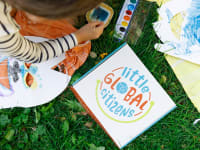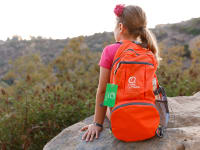KiwiCo vs Little Passports: Which kids' subscription box is better?
These science subscription boxes are STEM-tastic!
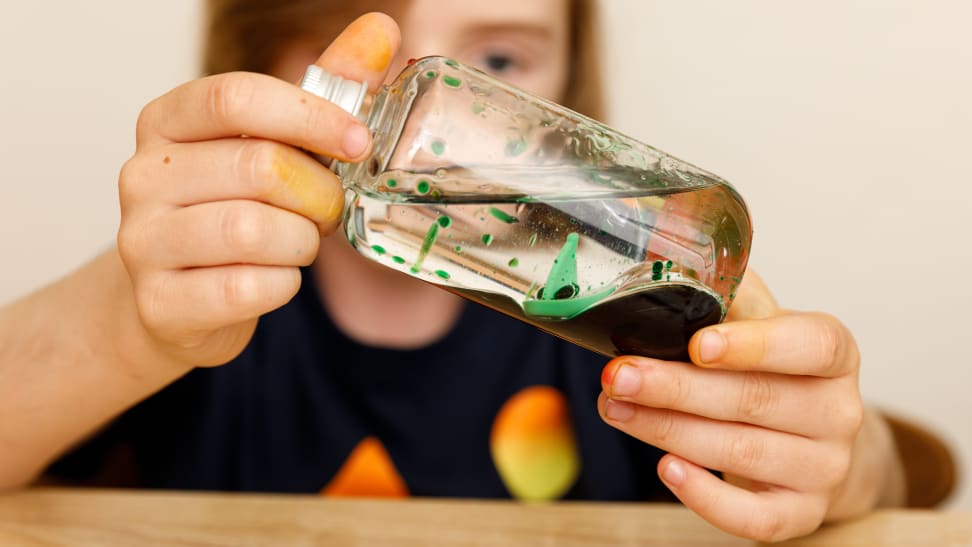 Credit:
Reviewed / Lisa Lawrence
Credit:
Reviewed / Lisa Lawrence
Products are chosen independently by our editors. Purchases made through our links may earn us a commission.
STEM and STEAM are the major educational buzzwords of the moment. Standing for “science, technology, engineering, arts, and math,” STEM and STEAM are integrated learning philosophies that expose kids to big-picture concepts that emphasize creativity, problem-solving, and critical thinking.
As we look to find ways to help kids learn these concepts in more organic ways, a flurry of toys and subscription crates have entered the market. Each promise to engage children in creative arts- and science-based activities that are fun, and engaging and help kids learn innovation and problem-solving through age-appropriate activities.
Two companies have emerged at the top of the market: KiwiCo and Little Passports. The two can seem almost interchangeable as they have many duplicate activities—each stamped with their own branding and style. We took a look at both to determine which kit is better.
KiWiCo vs. Little Passports: What’s the difference?

KiwiCo has been around since 2011 and really made its name delivering STEAM-based learning.
There is a lot of crossover between what KiwiCo and Little Passports offer. Founded in 2009, Little Passports was one of the first learning subscription boxes, with its travel-focused crates that teach kids about the world. KiwiCo arrived on the scene soon after in 2011 and made its name with crates that focus on science, art, and engineering. In the years since both of the mom-owned businesses launched, Little Passports has bulked up its STEM offerings, while KiwiCo has launched world travel line Atlas Crate.
What each kit includes
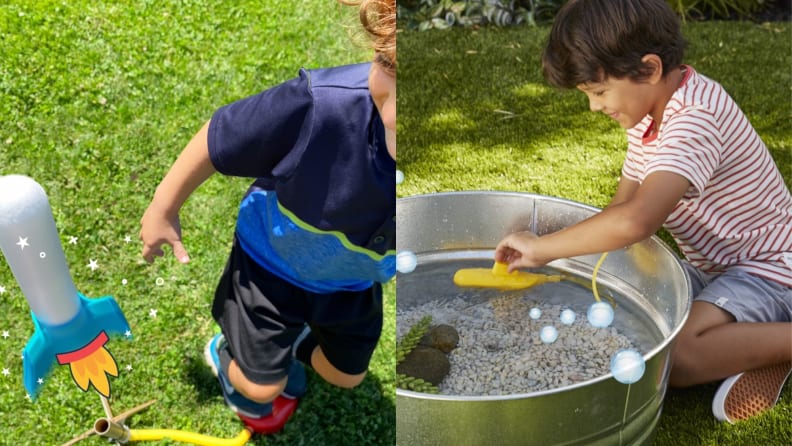
Little Passports was first a world travel-themed subscription, but they've expanded to offer science-based learning kits.
Figuring out what to order to compare the two was pretty challenging. We decided to look at it from the perspective of a gift giver or a parent who wanted to keep their kids entertained if they have to be cooped up at home for a few days and, because STEM toys are so popular, we went for their science offerings.
At the time of our testing, both companies offered three-kit science packs with complementing projects that could take kids through a week of creating and experimentation. We ordered the KiwiCo Young Chemists for $72.95, which offers three kid-appropriate chemistry experiments for children ages 5 to 8. From Little Passports, we opted for the Science Junior STEM 3-pack for $79.95, which has three different kits that explore engineering. Little Passports no longer offers the three-kit gift packs, but they do offer a two-kit pack that is similar for $54.95.
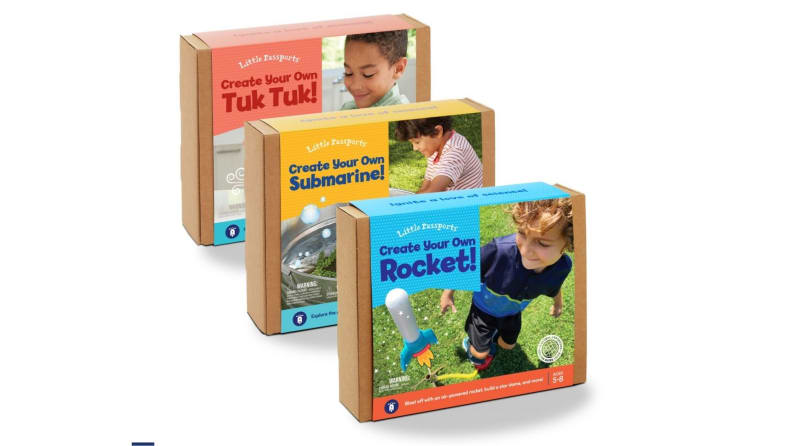
This engineering 3-pack was filled with cool concepts and fun DIY toy-building activities.
In our Little Passports delivery we got the Create Your Own Rocket, Create Your Own Submarine, and Create Your Own Tuk-Tuk boxes. These kits felt very physics-focused and were aimed at teaching about space exploration, deep-sea exploration, and elastic force, respectively. Each kit also comes with a fun comic-style activity book (which my son loved) that shows two kids, Sam and Sophia, on action-packed adventures. The booklets introduce readers to a scientist with expertise in a specific field of study and explain the scientific concepts taught in each kit. It also includes instructions for the activities, a glossary, and games like word-finders and mazes.
KiwiCo sent us Crystal Chemistry Garden, Colorful Chemistry, and Oil & Water Chemistry. This was more of a chemistry-focused set that teaches chemical reactions through a variety of activities. These kits also come with an activity booklet. These booklets take more of a “how and why” approach rather than a story-based approach like the Little Passports activity book.
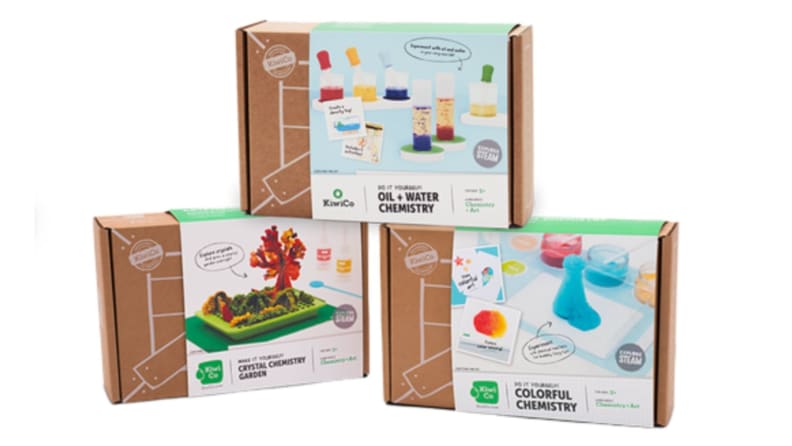
The Young Chemist 3-pack by KiwiCo is has everything your little scientist needs for fun and creative experimentation.
The bulk of the KiwiCo booklets are directions, but they also explain the why of each project with a fun, kid-friendly approach, and they give kids a more robust view of the scientific relevance of what’s happening with each project. It also gives ideas for adjacent projects—either with household “chemicals” (like vinegar, oil, baking soda, salt, and more) or links to more KiwiCo projects to find online through the robust idea blog.
My 7-year-old son volunteered to test. He loves creating chemical reactions with baking soda and vinegar; he also recently learned how to make a catapult at summer camp and he's angling to hone his engineering skills. Both deliveries looked like winners to him!
Price and style: How they compare
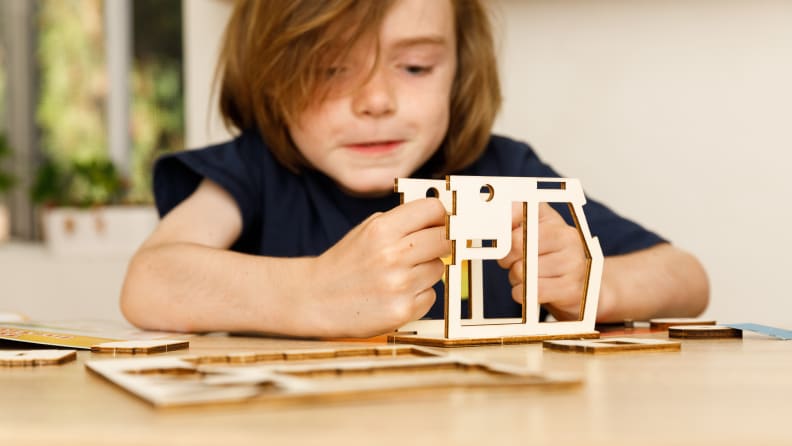
We loved the engineering activities in our Little Passports kits.
Cost-wise, the two subscriptions are nearly the same. Little Passports is slightly more expensive, charging $79.95 for the three-pack, compared with KiwiCo’s price of $72.95.
On the surface, both science-themed packs are pretty similar—even to the point where my son commented that “they must both be friends and share ideas.” Both kits come in cardboard boxes, about the size of a large shoe box, with a colorful printed slipcover indicating the activities inside.
The similarities don’t end on the outside of the box. These crates are theme-based, meaning that each box in both deliveries comes with two projects that are tangentially themed. For example, in one box KiwiCo includes an oil and water sensory bottle alongside an oil and water art project and Little Passports includes activities to make a diving submarine and a periscope. We loved that these aren't single-project boxes and that they both approach learning by making a full scientific concept more accessible to kids by approaching it in multiple ways.
While on the surface they appear quite similar, each distinct brand definitely has its own vibe. Little Passports has more of a mass-market appeal, with the fun, brightly colored, comic-book style activity book and plastic components. KiwiCo has more of an earthy quality to it with muted tones and a matte-finished activity book printed on thicker, recycled-feeling card stock. KiwiCo feels like a good choice for your arty friend, while Little Passport feels like a fit for comic-loving kids who like to follow a narrative story.
KiwiCo review
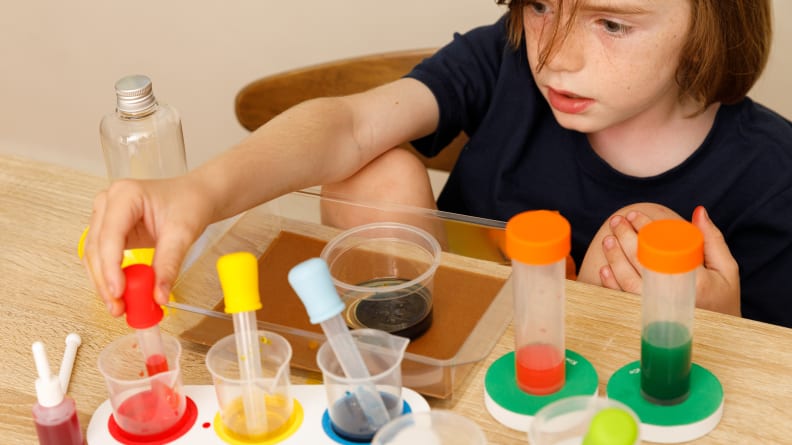
Each KiwiCo kit felt like it had lots of options for creativity.
We have never been disappointed with a KiwiCo crate, and this STEAM-based set didn’t disappoint. What we love about KiwiCo is they never skimp on the “art” in STEAM. Every crate we received truly had a fully creative element. There were lots of color mixing options in each kit to personalize what was made, allowing for thoughtful personalization.
It encourages creativity
I could see the gears working in my kid’s head as he thought of the potential of each project. When you consider that STEAM learning is all about problem-solving and innovation, KiwiCo delivers on that goal and prompts kids to make each project their own. If math and science typically feel constricting to your child, these kits may help break them out of that mindset.
It promotes bonding time
Each kit had enormous potential to be disastrously messy, so parental involvement was necessary—but these were fun and discussion-provoking projects that we could do together. If you’re like me and sometimes struggle with finding ways to play with your child in a truly connected way, these kits are a terrific avenue for forging that bond.
It includes fun components they can continue to use
There wasn’t a whole lot we didn’t like about the KiwiCo kits. Now that the activities are finished and the “chemical” components have been discarded, my son has a fun little set of lab tools with beakers, test tubes, droppers, and spray bottles. He enjoys filling them with colored water, and playing with other common household products to further conduct his “experiments.” It’s cool to see him feel like he has a greater understanding of chemistry as a result of these kits, so the experience has a lasting impact, which I appreciate.
Little Passports review
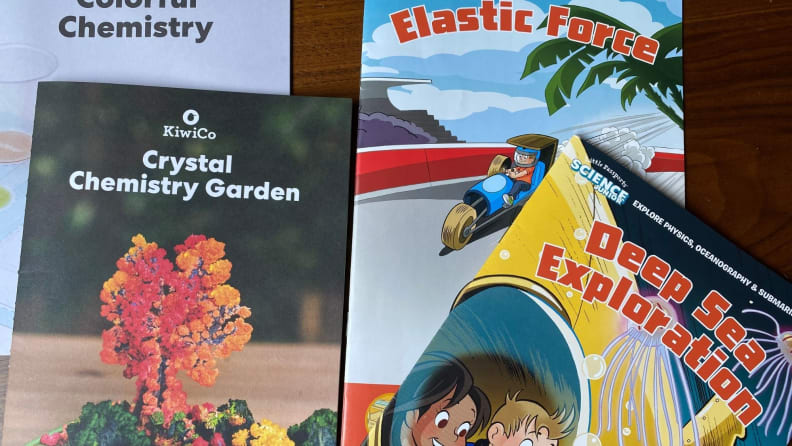
Our son definitely favored the Little Passports activity books.
This was the first time we tried Little Passports’ STEM offering. In the past, we’ve tried their world travel kits, which my son enjoyed. We were excited to dive deeper into the world of Little Passports with their science kits.
It promotes independent play
While these kits did require a bit of parental help in the form of lining things up with glue or tightly fastening components, your child creates toys they are able to run off and play with on their own, once completed. Our son really enjoyed playing with the submarine and the stomp rocket. Overall, however, if you’re looking for boxes that you can send your child off to play with on their own, these are a great, age-appropriate, and low-mess option.
It's more STEM than STEAM
These boxes are more STEM than STEAM, in that they lack the artistic component that is required to be STEAM. What that means is Little Passports kits are less about innovation and more about following step-by-step directions to a clear conclusion. There are clear instructions for the assembly of the included toys, but there is nothing that says, “What would you do?” or “How would you use your own creativity to make this?”
The comic book is cool, but other components are more forgettable
While these kits certainly were fun, we missed the imaginative inquiry that we got with KiwiCo. We also felt that after the activities were finished, our son didn’t have much interest in playing with the finished product. He loves the activity books and their comic section, and we’ll be holding onto those for a while, but the actual activities are all destined for the donation bin—or the trash.
The verdict
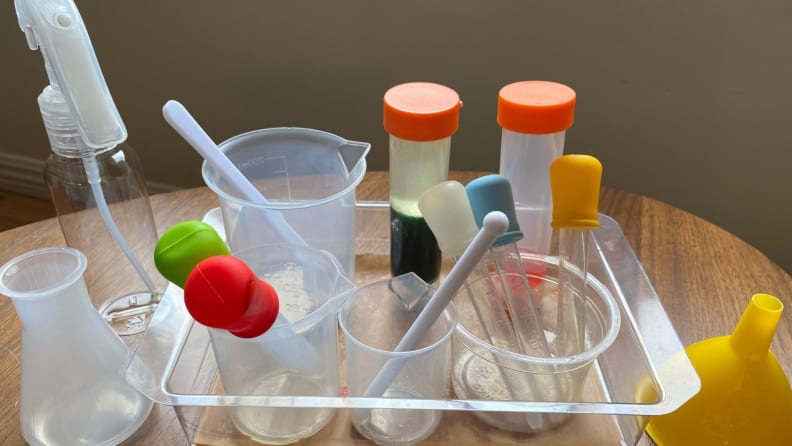
The KiwiCo set leaves your kid with a pretty respectable science lab set up.
In the end, which kit you choose really depends on your child’s learning style. Our son happens to love art- and craft-based learning and struggled a bit with the technical features of the Little Passports kit. He also is the type of kid who likes to steep in a lesson—if he likes it. Like most kids, his attention span is short for non-preferred learning but long when he’s engaged. The KiwiCo activities definitely required having an adult present, but it was a truly fun experience and we were both engaged for over an hour for each.
By contrast, the Little Passports activities only engaged him for maybe 40 minutes, but he has kept all of the comic books by his nightstand and reads them regularly and talks about them. If Little Passports had a subscription to just the comic books, we'd subscribe to that.
Which one should you buy?
In our family, the clear winner is KiwiCo.
While Little Passports is composed of a few independent projects that are related by theme, KiwiCo felt like a truly robust lesson that was hidden in a fun activity. Because of the connectivity and flow of each KiwiCo project, there was a light-on moment with my son where he would have a visible mental leap and a true understanding of the deeper concept of what he was learning.
I loved that these kits truly inspired the innovation and critical thinking that are a hallmark of STEM and STEAM learning. I also appreciated that the components of the kits were ones we would use over and over again. We found this to be the case with other KiwiCo crates in the past: Our son is proud of what he creates with his KiwiCo kits and repeatedly goes back to the toys he’s made from them. By contrast, our Little Passports kits were used for a few weeks and then were ready for the donation bin.
Based on our kid’s learning style, the length of engagement, cost, and the overall aesthetic appeal of the KiwiCo crates, they are clear the winner.

